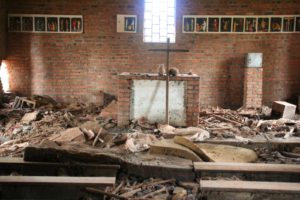Twenty-five years ago next month, graduates of Georgetown University’s School of Foreign Service—myself among them—were privileged to have as our commencement speaker Secretary-General of the United Nations Boutros Boutros-Ghali. The world’s top diplomat, of Egyptian descent and Christian faith, spoke in soaring terms of the “vast possibilities” for international cooperation under the auspices of the global organization he led. He promoted his “Agenda for Peace,” which included proposals for enabling the UN to “respond quickly and effectively to aggression.” He proclaimed, to hearty applause, that the “UN was the best available instrument for managing the world situation with a reasonable chance of success.” Boutros-Ghali’s outlook was as bright as the May sun that bathed our cap-and-gown-clad Class of 1994, assembled on the campus green.
But as the secretary-general spoke, thousands of miles away a humanitarian crisis of epic proportions was unfolding and made a mockery of his plea for peace and reassertion of the UN’s role. In Rwanda, the outnumbered Tutsi elite were being systematically slaughtered by machete-wielding Hutus on a genocidal scale. The bloodletting began in April 1994; by the time of our commencement, the death toll reached a quarter-million. Over the 100-day holocaust, an estimated 800,000 Rwandans perished. Not a word of Rwanda, however, passed the secretary-general’s lips in his commencement speech.

The international community, led by Boutros-Ghali, could hardly be blamed for causing the Rwanda genocide, which ignited from the embers of historic resentment that the prime minister’s murder sparked and hateful propaganda fanned. But the UN could be held to account for failing to heed its clear warning signs. In January, General Romeo Dallaire, the Canadian commander of the token international peacekeeping force deployed to Rwanda, sent to UN headquarters his infamous “genocide fax.” In it, he warned of plans by the Hutu junta to “register all Tutsi” in preparation “for their extermination.” To preempt the slaughter, Gen. Dallaire requested permission to raid arms caches that could fall into Hutu hands and enable their murderous designs. Kofi Annan, then head of UN peacekeeping operations, denied his request on the grounds that the blue helmets must remain neutral. Like Pilate, the UN would wash its hands of the Rwandan crisis. Genocide followed.
To atone for the UN’s negligence, Annan, who succeeded Boutros-Ghali as UN secretary-general, launched an ambitious initiative to amend the international legal framework governing humanitarian interventions to prevent genocide. Boutros-Ghali had eluded to the challenge in his Georgetown remarks. How can the UN, a body comprised of sovereign states sworn not to interfere in others’ internal affairs, legitimately and effectively address mass atrocities occurring within a member’s borders?
Annan’s answer, formulated by a Canadian-led panel of scholars, lawyers, and ethicists, was the promulgation of a new norm—the Responsibility to Protect, or R2P. The panel argued that with the rights accorded sovereign states came responsibilities, including the responsibility to protect its own citizens from mass atrocities. If a government failed to uphold this duty—either because it lacked the capacity or the will—then the international community had a responsibility to intervene, militarily if necessary, to address the humanitarian crisis. R2P’s tenants resemble Christianity’s just war criteria.
A controversy threatening to abort the new norm, however, regarded the authorization to intervene, or in just war parlance, legitimate authority. Annan deferred to the UN Charter, reserving for the UN Security Council the sole authority to permit the use of force against a sovereign state. The shortcomings of this legalistic approach manifest in the structural and moral deficiencies of the Council. Being a creature of positive law, in which right is determined ultimately by might, the Council tends to prioritize national self-interests above shared interests in addressing questions of an essentially moral character, such as humanitarian intervention. Moreover, given the veto-wielding power of its permanent members, including the authoritarian states Russia and China, concerted action is easily stymied.
For a fleeting moment, the UN Security Council did reach consensus on R2P in its rapid response to the genocidal threat Libyan strongman Muammar Gaddafi posed in 2009. For the first time, the Council cited the responsibility to protect in its authorization of NATO’s use of force to stop imminent mass atrocities in Libya. But, somewhat ironically, support dissipated after the intervention proved successful and the regime collapsed, stopping genocide but leaving chaos in its wake. The prospects for rebuilding UN Security Council consensus for R2P, especially with Russia regretting its acquiescence on Libya, remain in doubt.
There is little doubt, however, that the scourge of genocide will return. Acknowledging this threat, the United States took a meaningful step earlier this year in enacting the Elie Wiesel Act, named after the Nobel laureate and Holocaust survivor. This landmark legislation, passed with broad bipartisan and faith-based support, enshrines the connection between genocide prevention and US national security and establishes a governmental panel for monitoring genocidal threats abroad. US action to respond to such threats and uphold our responsibility to protect, however, still faces the legal obstacle of permanent member endorsement on the UN Security Council.
Interestingly, an innovative solution to this conundrum emerged from the same continent that witnessed genocide a quarter-century ago. With the Rwanda genocide and UN inaction still fresh in its collective memory, the African Union in 2005 hammered out its “Ezulwini Consensus” on UN reforms. This statement of solidarity references R2P, and grants that “in certain situations” UN Security Council authorization “could be granted ‘after the fact.’” In other words, act now and ask later. Importantly, the African Union conditioned such extraordinary measures on multilateral agreement, albeit short of UN endorsement. Although no single state could intervene in the affairs of another without prior UN approval, a collection of states, such as the African Union, could. The Ezulwini Consensus offered a legal theory for enabling regional organizations to act quickly to stop genocide while preserving the international stability that the prohibition against unilateral intervention provides.
Had the Ezulwini Consensus been operational in 1994, Gen. Dallaire may have been able to appeal to the African Union and marshal a more effective local response to the pressing danger in Rwanda rather than wait, in vain, for a positive reply from UN headquarters to his desperate fax. A show of arms by the international community at a critical moment in Rwanda’s trajectory of terror could have saved thousands of innocent lives. And, based on the deep regrets expressed by world leaders in the genocide’s aftermath, UN Security Council support for regional intervention “after the fact” would likely have been forthcoming.
Miraculously, Rwanda has rebounded from the moral catastrophe of 25 years ago. Strong domestic leadership plus sustained international support, including formation of the International Criminal Court to bring the genocide’s perpetrators to justice, has helped it cope with the national trauma. However, one participant in the crisis who has been unable to fully recover is Gen. Dallaire, who retired from the Canadian Army to become a humanitarian activist. He has struggled with post-traumatic stress disorder from the horrors he witnessed in Rwanda, and even attempted suicide in 2000. Gen. Dallaire has called the guilt he felt for not doing more to stop the genocide “a moral injury that ravages the mind.” Twenty-five years ago, the UN and its secretary-general failed to acknowledge or respond to the crisis unfolding in Rwanda. To heal the moral injury of its inaction, the international community should renew the responsibility to protect and empower regional organizations to uphold it. Such would be a fitting remembrance of the Rwanda genocide for the world.
Matt Gobush is a contributing editor to Providence and previously served on the staff of the National Security Council during the Clinton administration, the House of Representatives Foreign Affairs Committee, and the US Senate. He currently serves on the Standing Commission for World Mission of the Episcopal Church. Matt works in the private sector and lives in Virginia with his wife and five internationally adopted children.
Photo Credit: Nyamata Memorial Site in Rwanda. By Fanny Schertzer, via Wikimedia Commons.






